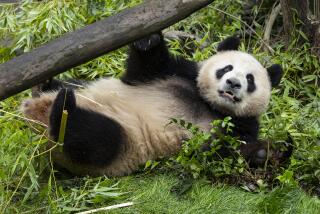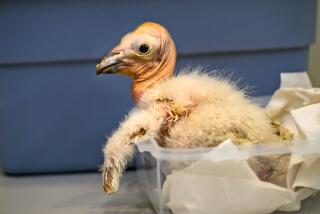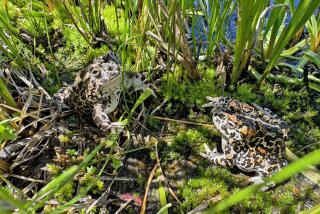A First for Bird Born in Captivity : Condor Hatched in Zoo Lays Milestone Egg
- Share via
Wildlife officials on Friday heralded the laying of yet another California condor egg in captivity--the third in a week--and proclaimed the newest egg especially significant because it was the first laid by a condor which itself was hatched in captivity and has never known the wild.
“This is a behavioral milestone,” said Tom Hanscom, spokesman for the San Diego Wild Animal Park, which is home to 15 of the 28 California condors now in captivity. The rest live at the Los Angeles Zoo, and none is believed still in the wild.
Of the 28 condors, 14 were born in captivity, either at the San Diego Zoo or the Wild Animal Park. But 13 of those came from eggs taken from the wild, and the 14th was an egg that was conceived in captivity by a breeding pair that was taken from the wild.
The newest egg, however, was laid by a condor named Almiyi, which was hatched in captivity.
“We now know that a condor who has only known a captive life is capable of reproducing, and that will have to be the case if we hope to keep the species alive,” Hanscom said. “We can’t keep relying on condors taken from the wild laying eggs, because they will eventually die off, and we will only have birds hatched in captivity.”
He cautioned that, although the egg-laying itself is significant, there is concern that the egg may not be fertile because Almiyi is 6 years old, and condors are generally not sexually mature until age 7.
The newest egg was laid between dusk Thursday and dawn Friday in the Wild Animal Park’s so-called “condorminium” away from public view, Hanscom said. Gestation lasts 55 to 60 days, but officials hope to determine within 4 to 10 days whether the egg is fertile by placing a high-intensity lamp behind it and looking for development.
Almiyi’s breeding partner was Paxa, who was born in the wild in 1981 and captured in 1982.
The newest addition is the third California condor egg to be laid in recent days.
On Monday, Los Angeles Zoo officials discovered that one of their captive pairs of condors--Cuyama and Cachuma--had produced an egg, and it was whisked on Tuesday to the Wild Animal Park east of Escondido, because of its experience in handling California condor eggs.
That breeding pair also is about 6 years old, and officials say their egg may also prove infertile. It was the first California condor egg laid at the Los Angeles Zoo.
Also on Tuesday, two condors at the Wild Animal Park laid their second egg in captivity. The pair, known as UN1 and AC4, are the same that produced the female chick Molloko from the first egg laid in captivity last March.
Hanscom said that, although the Los Angeles egg and the most recent egg may both be infertile, because of the youth of the breeding pairs, “we’re encouraged by the fact that they’re giving it a try.”
7 Males Give Courtship Displays
Officials note that, between the two animal facilities, at least seven males are giving courtship displays this season.
For each of the three breeding pairs, officials took the egg with the hope that the pairs would double-clutch, or try to replace the missing egg with another one, before the end of their breeding season. In the wild, California condors produce and raise, on the
average, one chick every two years.
The fact that birds taken from the wild would produce eggs in captivity was the significant milestone reached with the birth last March of Molloko, Hanscom noted. But the newest lesson has even farther-reaching ramifications, because it offers behavioral proof that birds that have never experienced the wild still will breed.
Besides trying to promote double-clutching, handlers take eggs from parents to help ensure their successful hatching. Officials say they are concerned that California condors have little experience at parenting, and they want to take as few chances as possible.
Wild Animal Park officials noted, for instance, that after UN1 and AC4 produced their egg on Tuesday, the male, AC4, lunged at the egg, striking it with its beak. The egg was removed by technicians before any damage was done.
More to Read
Sign up for Essential California
The most important California stories and recommendations in your inbox every morning.
You may occasionally receive promotional content from the Los Angeles Times.










